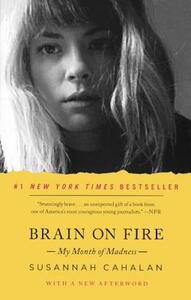Take a photo of a barcode or cover
emotional
informative
sad
medium-paced
Seriously gripping - I couldn't put this down. Her inexplicable seizures and psychosis will definitely get your adrenaline pumping. It was kind of weirdly shaped, though, maybe because the author couldn't remember anything that happened and had to rely on research. I wasn't really sure what she was building towards, and the short chapters sometimes gave it a very choppy feel. The writing never lost that over-dramatic tabloid feel, which was annoying. Just the same, an enlightening - and disturbingly compelling - read. Recommended to anyone interested in mental health, especially.
challenging
hopeful
informative
mysterious
reflective
medium-paced
As a future medical practitioner, it felt so refreshing to see a patient’s point of view. During our studies, we are taught to see patients more as cases than people. It was a privilege to be allowed a glimpse into how her condition affected her daily life and her relationships, not only her body.
The story is told as a sort of mystery at first, which allows the reader to live through the events as they happened to Cahalan. Her experience as a journalist really shines there. Her vulnerability and honesty were also strong-suits for the novel. In many memoirs, authors tend to avoid portraying themselves in anything but a good light. This choice from the author allowed her humanity to shine through.
I appreciated the balance between the objective theory (medicine, science) and her personal experience.
I will definitely be recommending this book to my classmates! 😊
The story is told as a sort of mystery at first, which allows the reader to live through the events as they happened to Cahalan. Her experience as a journalist really shines there. Her vulnerability and honesty were also strong-suits for the novel. In many memoirs, authors tend to avoid portraying themselves in anything but a good light. This choice from the author allowed her humanity to shine through.
I appreciated the balance between the objective theory (medicine, science) and her personal experience.
I will definitely be recommending this book to my classmates! 😊
informative
medium-paced
Although it is categorized as a memoir, this book does not quite read like one. Susannah Cahalan does not remember the events presented in the book and, as such, she relies on the retelling of her family and friends, as well as the physical traces left behind by doctors documenting her symptoms, to write her memoir.
While Cahalan's ability to string together a well constructed story with only facts is certainly impressive, it also makes the storytelling feel superficial and overly-analytical. I find it hard to connect with any character—including Susannah—because we are constantly told how they feel, but never shown how they feel.
If the brain fascinates you and you wish to study it theoretically or with a more scientific approach, however, I do believe you'll enjoy this book. Cahalan explains a lot of neurological and medical terms, and I simply didn't find it interesting.
While Cahalan's ability to string together a well constructed story with only facts is certainly impressive, it also makes the storytelling feel superficial and overly-analytical. I find it hard to connect with any character—including Susannah—because we are constantly told how they feel, but never shown how they feel.
If the brain fascinates you and you wish to study it theoretically or with a more scientific approach, however, I do believe you'll enjoy this book. Cahalan explains a lot of neurological and medical terms, and I simply didn't find it interesting.
dark
fast-paced
dark
informative
mysterious
tense
medium-paced
This book highlights the importance of empathy in the medical profession and calls attention to the grave harm of misdiagnoses that can result from lack of information or simply not taking the time to dive deeper into a parent's case. By the end, there is also some hope in that though sharing her story, others get access to real help, and medical science is furthered. Even the doctor who had decided she was simply "partying" too hard rather than take her symptoms more seriously (my rage boiled over reading about this man) eventually refers to her experience to direct patients to help. Part memoir, part call to action, part humane medical text(??), the author weaves us through her month of madness, using interviews, journals, and hospital footage to help complete the story. Engaging, well-done.
Graphic: Terminal illness, Blood, Medical content, Medical trauma, Schizophrenia/Psychosis
Moderate: Cancer, Death, Mental illness, Excrement, Vomit, Dementia
dark
emotional
informative
mysterious
I don’t think you can “enjoy” a book like this. It made me uncomfortable, but in a good way. Like, you can’t not be uncomfortable watching someone go mad.
I did appreciate it though, and it was very interesting.
I did appreciate it though, and it was very interesting.
I really enjoyed hearing Susannah's perspective. It was an illuminating look inside someone's brain during and in the aftermath of a psychotic episode.





